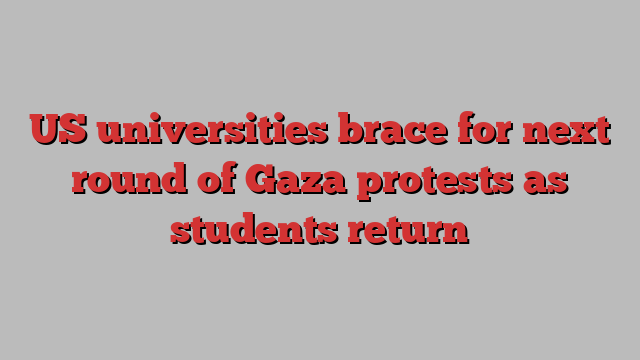
Universities across the US are tightening rules on protests, raising fresh concerns over free speech and faculty governance at the start of the new academic year as they brace for further campus tensions linked to the conflict in Gaza.
As students begin to arrive on campus after a spring marked by fierce protests, clashes and arrests at many leading institutions, officials are seeking ways to limit renewed troubles and learn the lessons of the past few months.
They are under intense scrutiny from politicians, alumni and donors as well as their own faculty in the build-up to November’s US presidential election and the first anniversary of the October 7 Hamas attack on Israel.
John King, chancellor of the State University of New York, said: “You have to worry. We have been preparing table top exercises, and exploring civil discourse on how to express different views respectfully and appropriately.”
Many leaders are seeking to stress the importance of free speech and respect for others, on pain of tough disciplinary measures for those who disrupt university life.
In a note to students, staff and faculty, Santa Ono, president of the University of Michigan, highlighted its students’ responsibilities and commitments to freedom of expression. “One person’s right to protest must not infringe on the rights of others, endanger our community or disrupt the operations of the university,” he warned.
Institutions including New York University have resolved to enforce sanctions on students judged in violation of their codes of conduct during disruptive demonstrations in recent months, and to consolidate future disciplinary hearings into a single centralised team.
They are mindful of the fallout from protests and pressure in recent months, which have cost at least three Ivy League presidents their jobs. Many more leaders face lawsuits and regulatory investigations linked to claims that they responded inadequately to antisemitic or anti-Muslim actions.
Some of the fallout has landed in the courts: a federal judge this month issued an injunction preventing the University of California — the scene of clashes between demonstrators and with police in April — from allowing pro-Palestinian protesters to block Jewish students from accessing campus buildings.
Critics of student protests have called for tough action against harassment. The American Council of Trustees and Alumni, a conservative-leaning non-profit, has issued guidance recommending rules “forbidding encampments and harassment and establishing sanctions for infractions” and rebuffing calls for divestment from Israel — one widespread demand from many pro-Palestinian student protests.
Harvard University, whose president Claudine Gay resigned at the start of this year after criticism of how the institution handled the protests, is among those that has strengthened and pulled together in one place rules for students. It warns that practices including camping, chalking messages or the use of amplified sound are forbidden without prior authorisation.
But others are concerned about restrictions on students and faculty autonomy. The Association of American University Professors has warned that colleges have “hastily enacted overly restrictive policies . . . [which] impose severe limits on speech and assembly that discourage or shut down freedom of expression” and curtail the rights of students and faculty.
Risa Lieberwitz, a professor of law at Cornell University and the association’s general counsel, singled out the University of Pennsylvania, whose president resigned last December. Its new “temporary standards” restrict the use of bullhorns and require prior registration and approval of events in public spaces such as its central Locust Walk, including a security assessment two weeks in advance. It outlaws encampments and overnight demonstrations. Penn declined to comment.
She said: “We are seeing multiple schools adopting new restrictions on speech without respecting governance procedures. They will discourage protests, have a chilling effect on freedom of speech and threaten harsh sanctions without due process.”
“We can strongly infer [the rules] are made to appease politicians calling for the use of a heavy hand on protests, donors and boards of trustees,” she added. “It’s this external audience that universities seem to be most concerned about.”
Alongside tougher measures designed to limit disruption, universities are seeking to enhance formal education for students on topics including the history of the Middle East and foster greater tolerance for different views outside the classroom.
Caroline Mehl, chief executive of the Constructive Dialogue Institute, a nonprofit she founded with the academic Jonathan Haidt in 2017, said it had seen a surge in interest in its training programmes for college administrators, faculty and students in recent months, and it was now working with 88 universities across the country.
“We have been growing really rapidly this past year,” she said. “Ever since October 7 and the congressional hearings, there has just been a surge in demand for our work.”
One Ivy League administrator hoped the effects of Covid-19 — which created a generation isolated during lockdowns and more aggressive and less socially integrated afterwards — could be on the wane in the incoming student cohort.
Yet history, location and the nature of students and faculty mean some universities, such as Columbia, whose president Minouche Shafik just resigned, and Harvard, are likely to remain in the spotlight in the weeks ahead.